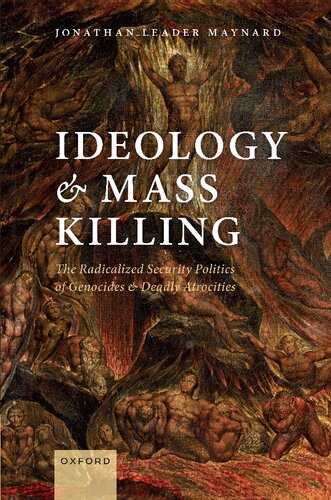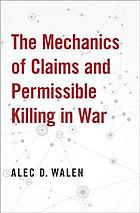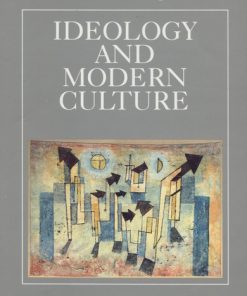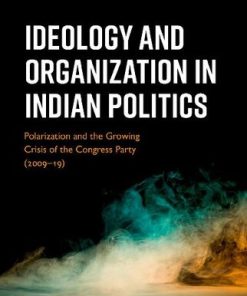Ideology and Mass Killing The Radicalized Security Politics of Genocides and Deadly Atrocities 1st edition by Jonathan Leader Maynard 0191082665 9780191082665
$50.00 Original price was: $50.00.$25.00Current price is: $25.00.
Ideology and Mass Killing: The Radicalized Security Politics of Genocides and Deadly Atrocities 1st edition by Jonathan Leader Maynard – Ebook PDF Instant Download/DeliveryISBN: 0191082665, 9780191082665
Full download Ideology and Mass Killing: The Radicalized Security Politics of Genocides and Deadly Atrocities 1st edition after payment.

Product details:
ISBN-10 : 0191082665
ISBN-13 : 9780191082665
Author: Jonathan Leader Maynard
In research on ‘mass killings’ such as genocides and campaigns of state terror, the role of ideology is hotly debated. For some scholars, ideologies are crucial in providing the extremist goals and hatreds that motivate ideologically committed people to kill. But many other scholars are sceptical: contending that perpetrators of mass killing rarely seem ideologically committed, and that rational self-interest or powerful forms of social pressure are more important drivers of violence than ideology. In Ideology and Mass Killing, Jonathan Leader Maynard challenges both these prevailing views, advancing an alternative ‘neo-ideological’ perspective which systematically retheorises the key ideological foundations of large-scale violence against civilians. Integrating cutting-edge research from multiple disciplines, including political science, political psychology, history and sociology, Ideology and Mass Killing demonstrates that ideological justifications vitally shape such violence in ways that go beyond deep ideological commitment. Most disturbingly of all, the key ideological foundations of mass killings are found to lie, not in extraordinary political goals or hatreds, but in radicalised versions of those conventional, widely accepted ideas that underpin the politics of security in ordinary societies across the world. This study then substantiates this account by a detailed examination of four contrasting cases of mass killing – Stalinist Repression in the Soviet Union between 1930 and 1938, the Allied Bombing Campaign against Germany and Japan in World War II from 1940 to 1945, mass atrocities in the Guatemalan Civil War between 1978 and 1983, and the Rwandan Genocide in 1994. This represents the first volume to offer a dedicated, comparative theory of ideology’s role in mass killing, while also developing a powerful new account of how ideology affects violence and politics more generally.
Ideology and Mass Killing: The Radicalized Security Politics of Genocides and Deadly Atrocities 1st Table of contents:
1. Introduction
1.1 The Puzzle of Mass Killing
1.2 Ideology and Its Critics
A Neo-Ideological Perspective
Advancing the Debate
1.3 Elaborating the Argument
Conceptualizing ‘Mass Killing’ and ‘Ideology’
Ideology, Perpetrator Coalitions, and Political Crisis
On Method
1.4 Plan of the Book
2. Clarifying Ideology
2.1 What Are Ideologies?
Narrow Conceptualizations
Broad Conceptualizations
2.2 How Do Ideologies Influence Behaviour?
Internalized Ideology: Commitment and Adoption
Ideological Structures: Conformity and Instrumentalization
Infrastructural Diversity
2.3 Conclusion
3. How Does Ideology Explain Mass Killing?
3.1 Explaining Mass Killing Without Ideology?
Rationalist Explanations
Situationist Explanations
3.2 The Basic Argument: Ideologies and Political Crises
The Emergence of Justificatory Narratives for Mass Killing
Ideological Security Doctrines and Political Crises
3.3 Ideology and Perpetrator Coalitions
Building a Perpetrator Coalition
Political Elites
Rank-and-File Agents
Public Constituencies
3.4 The Roots of Hardline Ideology
3.5 Conclusion
4. The Hardline Justification of Mass Killing
4.1 What Kinds of Ideologies Matter?
The Traditional Focus: Revolutionary Transformations and Moral Disengagement
The Neo-Ideological Focus: Radicalized Security Politics
4.2 The Power of Justificatory Narratives
Portraying the Victims: Threat, Guilt, and Exclusion
Portraying the Violence: Virtue, Future Goods, and Inevitability
The Limitationist Alternative
4.3 Conclusion
5. Stalinist Repression
5.1 Overview
5.2 Explaining the Rise of Stalinism
Marxism, Leninism, and the Early Soviet Union
Stalinist Radicalization
5.3 Stalinism and Repressive Mass Killing
The Stalinist Elite
The Rank-and-File of Stalinist Violence
Publicly Justifying Stalinist Repression
5.4 Conclusion
6. Allied Area Bombing in World War II
6.1 Overview
6.2 The Roots of Allied Bombing Doctrines
Early Ideas of Air Power
The Development of Air Doctrine in Interwar Britain
The Development of Air Doctrine in the Interwar United States
6.3 Ideology and Area Bombing in World War II
Policymakers and the Ideology of Area Bombing
The Rank-and-File Bombers
The Public Legitimation of Area Bombing
Ideological Restraints
6.4 Conclusion
7. Mass Killing in Guatemala’s Civil War
7.1 Overview
7.2 The Evolution of Military Ideology
7.3 Ideology and Counter-Insurgent Mass Killing
The Military’s Political Elite
Rank-and-File Agents in Guatemala’s Mass Killings
Public Justification of the Killings
The American Connection
7.4 Conclusion
8. The Rwandan Genocide
8.1 Overview
8.2 The Evolution of Hardline Hutu Ethnonationalism
Hutu and Tutsi Identity in Rwanda
The Second Republic Under Habyarimana
Hardline Radicalization in the 1990s
8.3 Ideology in the Genocide
The Hutu Power Elite
Rank-and-File Agents in the Genocide
Disseminating the Hardline Narrative
8.4 Conclusion
9. Conclusion
9.1 The Role of Ideology in Mass Killing
9.2 Moving Forward
9.3 Prediction and Prevention
9.4 The Problem of Extremism and Atrocity
People also search for Ideology and Mass Killing: The Radicalized Security Politics of Genocides and Deadly Atrocities 1st:
the radicalization of the american revolution
explain the rise of radicalism in the u.s
radicalization in politics
radicalized government definition
the radical government
Tags: Ideology, Mass Killing, The Radicalized, Security Politics, Genocides, Deadly Atrocities, Jonathan Leader Maynard
You may also like…
Politics & Philosophy
The mechanics of claims and permissible killing in war Walen
Politics & Philosophy - Politics
Ideology and Mass Killing: The Radicalized Security Politics of Genocides and Deadly Atrocities
Business & Economics - Responsibility and Business Ethics
The Ethics of Killing: Life, Death and Human Nature 1st Edition
Social Science
Politics & Philosophy - International Relations
The EU, Irish Defence Forces and Contemporary Security 1st Edition












